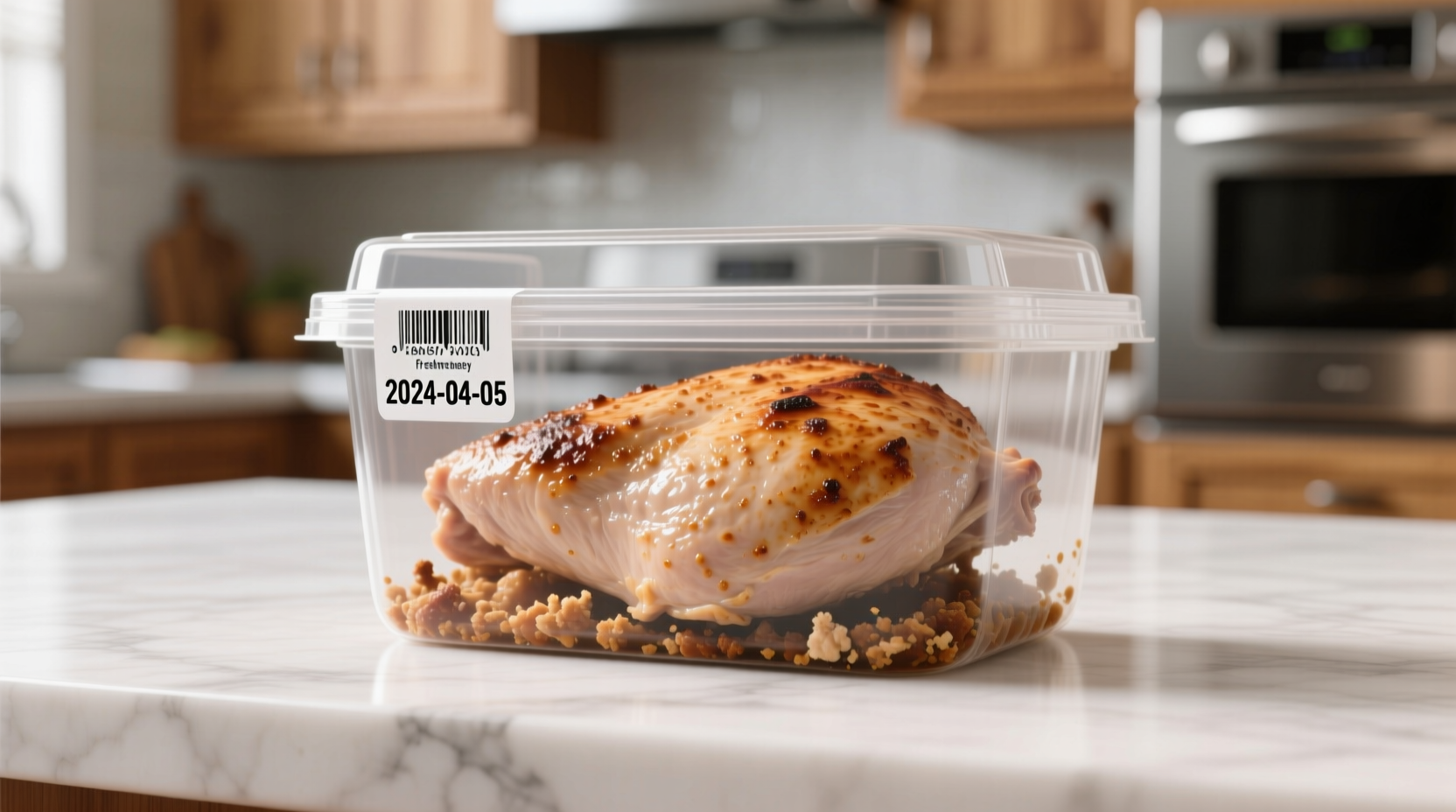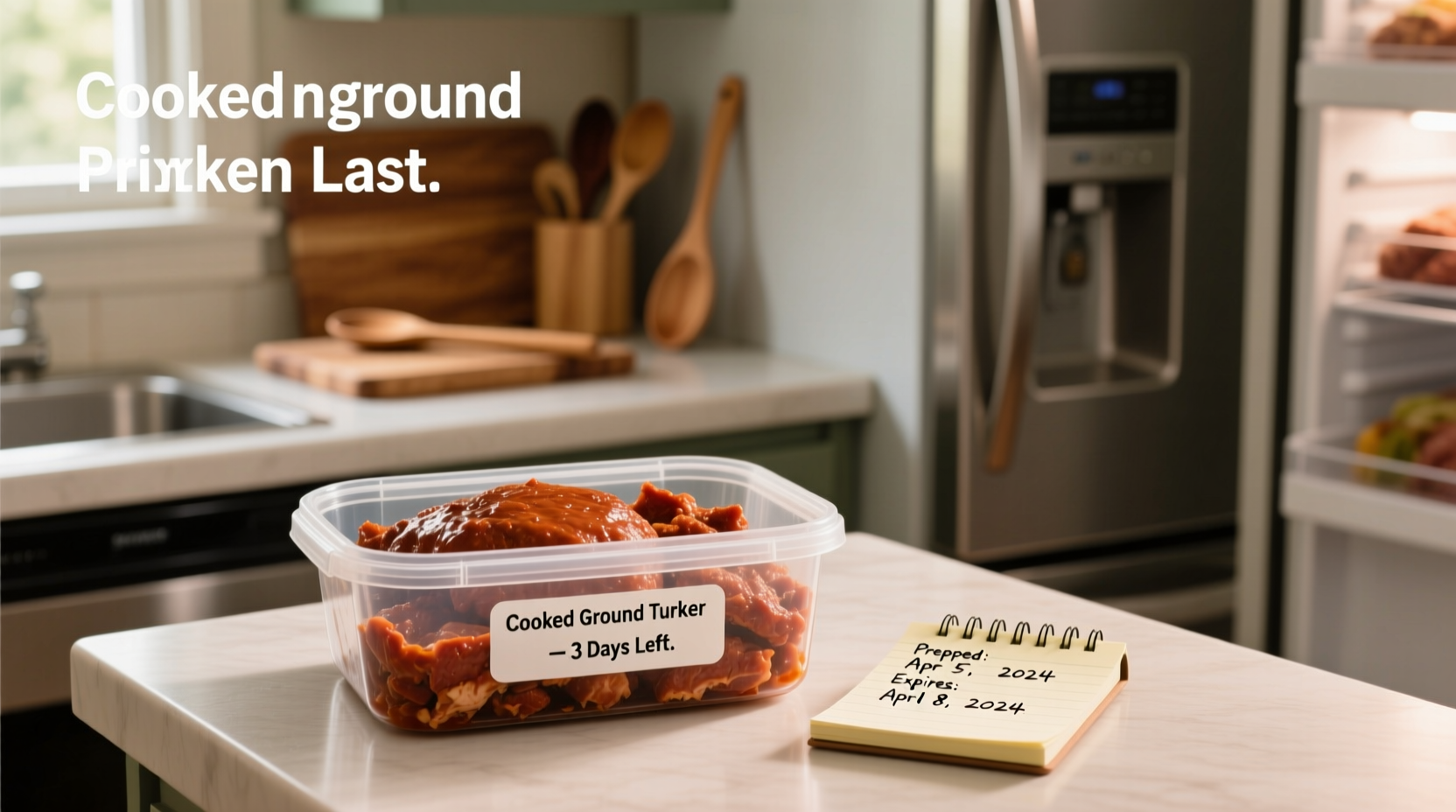Discover exactly how to maximize freshness, recognize spoilage signs, and safely extend your cooked ground turkey's shelf life with this comprehensive guide. You'll learn professional storage techniques, visual indicators of deterioration, and science-backed recommendations from food safety authorities.
The Science Behind Cooked Turkey Shelf Life
Understanding why cooked ground turkey has a limited refrigerator lifespan starts with food microbiology. When turkey reaches the "danger zone" between 40°F and 140°F, bacteria like Salmonella and Staphylococcus aureus multiply rapidly. Ground turkey's increased surface area compared to whole cuts accelerates this process.
According to the USDA Food Safety and Inspection Service, cooked poultry products maintain safety for 3-4 days under proper refrigeration because:
- Bacterial growth slows significantly but doesn't stop at refrigerator temperatures
- Moisture content in cooked ground meat creates an ideal environment for pathogens
- Repeated temperature fluctuations during refrigerator access accelerate spoilage
Official Food Safety Guidelines Compared
| Storage Method | Recommended Duration | Source | Maximum Safe Extension |
|---|---|---|---|
| Refrigerator (40°F or below) | 3-4 days | USDA FSIS | Not recommended |
| Freezer (0°F or below) | 2-3 months | FDA Food Code | Up to 4 months (quality decline) |
| Room Temperature | 2 hours max | CDC Guidelines | 1 hour if above 90°F |
This comparison reflects current standards from authoritative food safety organizations. The USDA's FoodSafety.gov consistently maintains the 3-4 day guideline for cooked ground meats, noting that "the refrigerator slows but doesn't stop bacterial growth."
Proper Storage Techniques That Actually Work
How you store cooked ground turkey significantly impacts whether it reaches the full 4-day window. Follow these evidence-based methods:
- Cool rapidly: Divide large quantities into shallow containers (no more than 2 inches deep) to cool within 2 hours
- Airtight containment: Use vacuum-sealed bags or rigid containers with tight-fitting lids to prevent moisture loss and odor absorption
- Strategic placement: Store on middle refrigerator shelves (not door compartments) where temperature remains most consistent
- Label everything: Note cooking date with permanent marker directly on container
Research from the Journal of Food Protection shows that vacuum-sealed storage extends cooked poultry shelf life by 25% compared to standard containers by limiting oxygen exposure that accelerates spoilage.

When Standard Guidelines Don't Apply: Context Boundaries
Certain conditions require adjusting the standard 3-4 day rule. Recognize these critical context boundaries:
- Added ingredients: Mixtures containing dairy, eggs, or cooked vegetables reduce shelf life to 2-3 days
- Temperature fluctuations: Fridges above 40°F (common in older models) shorten safe period to 2 days
- Initial cooking temperature: Turkey cooked to 165°F lasts longer than undercooked portions
- Reheating history: Previously reheated leftovers should be consumed within 1-2 days
The FDA Food Code specifies that "time as a public health control" only applies when strict temperature monitoring occurs - conditions rarely met in home kitchens. This explains why food safety experts universally recommend conservative timelines for home storage.
Spoilage Signs You Can't Ignore
Don't rely solely on calendar dates. Watch for these visual, olfactory, and textural warning signs:
| Indicator | Fresh Ground Turkey | Spoiled Ground Turkey |
|---|---|---|
| Color | Bright pink to light brown | Grayish-green discoloration |
| Smell | Mild cooked meat aroma | Sour, ammonia-like, or rotten odor |
| Texture | Moist but not slimy | Slippery film or sticky surface |
| Container | ||
| No unusual condensation | Excessive liquid or bubbling |
When in doubt, throw it out. The USDA emphasizes that "pathogenic bacteria that cause foodborne illness don't always produce obvious signs of spoilage." A 2023 study in Food Microbiology found that Clostridium perfringens can reach dangerous levels in cooked ground meat without noticeable odor changes.
Freezing: Your Best Option for Longer Storage
When you can't consume leftovers within 4 days, freezing preserves both safety and quality:
- Portion into 1-cup servings for recipe-ready portions
- Remove air from freezer bags using the water displacement method
- Label with contents and date using freezer-safe markers
- Thaw safely in refrigerator (never at room temperature)
While frozen ground turkey remains safe indefinitely, quality peaks within 2-3 months. After 4 months, freezer burn and texture degradation become noticeable. The National Center for Home Food Preservation confirms that vacuum-sealed portions maintain optimal quality for 6 months.
Avoid These Common Leftover Mistakes
Food safety experts consistently observe these dangerous practices:
- The sniff test fallacy: Pathogens like Staphylococcus produce toxins undetectable by smell
- Room temperature cooling: Leaving turkey out to cool extends time in the danger zone
- Stacked containers: Blocking airflow in the refrigerator creates uneven cooling
- Reusing containers: Previously used containers may harbor bacterial colonies
Remember that "how long does cooked ground turkey last in the fridge" depends on your specific storage practices. When following proper food handling protocols, you'll consistently achieve the maximum 4-day shelf life.
Frequently Asked Questions
Can cooked ground turkey last 5 days in the refrigerator?
No, cooked ground turkey should not be consumed after 5 days in the refrigerator. The USDA strictly recommends discarding cooked ground turkey after 3-4 days even when stored properly at 40°F or below. Bacteria that cause foodborne illness can multiply to dangerous levels without visible signs of spoilage.
What's the best container for storing cooked ground turkey?
Vacuum-sealed containers provide the longest shelf life by eliminating oxygen exposure. For everyday use, rigid BPA-free plastic containers with airtight silicone seals work well. Glass containers with locking lids are excellent alternatives that prevent odor absorption. Always choose containers sized to minimize empty space above the food.
How can I tell if cooked ground turkey has gone bad?
Look for grayish-green discoloration, slimy texture, sour or ammonia-like odor, and excessive liquid in the container. However, dangerous pathogens often don't produce visible signs, so always follow the 3-4 day rule regardless of appearance. When in doubt, discard the food - don't risk foodborne illness.
Can I refreeze cooked ground turkey after thawing?
Yes, but only if thawed in the refrigerator and not left at room temperature. Refreezing may affect texture quality but maintains safety. Each freeze-thaw cycle degrades quality, so for best results, portion before initial freezing and use within 2-3 months. Never refreeze if thawed using cold water or microwave methods.
Does reheating extend cooked ground turkey's shelf life?
No, reheating does not reset the clock on food safety. Each reheating cycle actually accelerates quality degradation. The USDA states that previously reheated leftovers should be consumed within 1-2 days. Always reheat to 165°F minimum and cool rapidly before returning to refrigeration.











 浙公网安备
33010002000092号
浙公网安备
33010002000092号 浙B2-20120091-4
浙B2-20120091-4